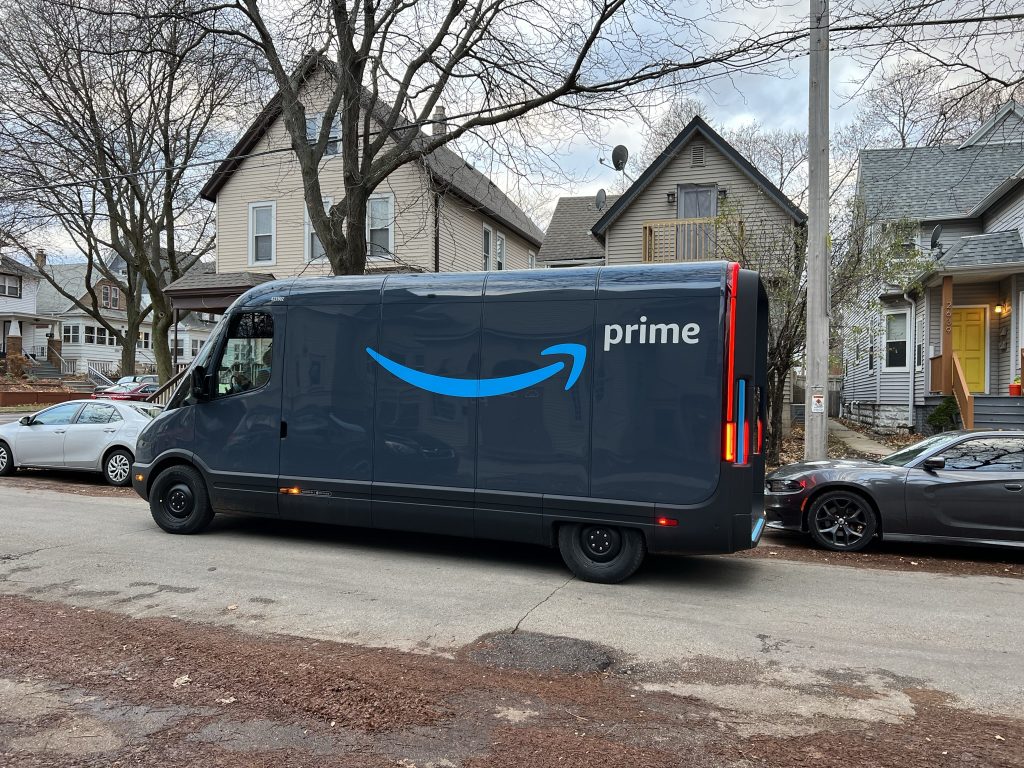Court Will Decide If Amazon Drivers Are Really Independent Contractors
Wisconsin Supreme Court will rule on case, which would make workers eligible for unemployment.
The Wisconsin Supreme Court will hear arguments next week about whether a group of drivers who deliver packages for Amazon should be considered employees, qualifying them for unemployment compensation if they lose their jobs.
Amazon considers the “delivery partners” to be independent contractors — self-employed business owners outside the unemployment insurance (UI) system. But the Department of Workforce Development (DWD), which administers Wisconsin’s UI program, contends they’ve been misclassified and that Amazon owes more than $200,000 to the state’s UI fund.
While enthusiasts contend these on-demand services give participants and workers flexibility, worker advocates argue that it’s one of many trends undermining workers’ rights, wages and benefits.
“Calling workers ‘independent contractors’ deprives them of core rights and protections such as minimum wage, overtime pay, [employer] contributions to Social Security, the right to collective bargaining under the National Labor Relations Act, workers’ compensation, unemployment compensation, and protection from discrimination,” the National Employment Law Project declared in a 2020 report. NELP calculated that 10-30% of employers misclassify employees as independent contractors.
A 2022 report from the Economic Policy Institute (EPI), a research and policy organization in Washington, D.C., that looks at the impact on workers of economic trends and policies, listed delivery drivers as one of 11 occupations with workers “particularly vulnerable to illegal misclassification.”
“We’re literally talking about generations of policymaking and struggle that workers have engaged in to set some basic expectations and standards in our history, and also the contemporary expectation that most U.S. residents have about some basic, very minimal floors that we want to set for standards in our labor market,” said Jennifer Sherer, director of the State Worker Power Initiative at EPI.
‘Delivery partners’
The company at the center of the Supreme Court case on Tuesday is Amazon Logistics, a subsidiary of the online retail behemoth. The drivers involved are not the ones behind the wheel of the ubiquitous blue-gray panel vans bearing the company’s smile logo, however.
Amazon Logistics pays a separate group of “delivery partners” who use their own vehicles to provide what the company described in a legal brief as “last-mile” delivery to customers’ doorsteps. Amazon says it has also contracted with the U.S. Postal Service and package-delivery businesses such as UPS and FedEx to provide that same service.
Drivers participating in the “delivery partner” program install a dedicated Amazon Flex app on their smartphones. The app displays delivery time blocks two or four hours long. A block consists of a collection of packages that the company has grouped together for a single driver to take to their final destinations.
Each block has a designated fee. According to case records, the standard fees in 2016-2018 were $36 for two hours and $72 for four hours. Amazon increases that fee in certain high-demand situations.
Drivers use the app to claim a particular time block. They get instructions on where to pick up the packages assigned to that block and deliver them accordingly.
Amazon started using the delivery partner system in Wisconsin in late 2016, with drivers picking up packages from a Milwaukee Amazon warehouse and later from a warehouse in the Milwaukee suburb of Sussex. In its first few months more than 400 people were working as delivery partners, and within two years the number had grown to more than 1,000, according to DWD.
In addition to delivering regular Amazon packages, delivery partners also provide ultra-fast package delivery (marketed as Prime Now) as well as grocery delivery for Amazon Fresh and Whole Foods.
Amazon gets audited
After Amazon expelled a driver in 2017, the man filed for unemployment compensation. Independent contractors don’t qualify for jobless pay, but the filing prompted DWD to audit the delivery partner program.
The audit concluded that out of more than 1,000 participants, only two were established delivery companies that qualified as legitimate independent contractors. DWD told Amazon in 2018 that the company owed the state $205,436 in unemployment insurance premiums and penalties for workers who should have been counted as employees instead of independent contractors.
The state law requires that to be classified as an independent contractor a worker must be free from an employer’s “control or direction,” administrative law judge Lisa Gilmore wrote in her June 2019 decision. In addition, the worker must meet at least six of nine other conditions that demonstrate “economic independence and entrepreneurial risk.”
Gilmore’s decision found that while the delivery partner program met four out of five conditions related to employer control, it only met one of the conditions for independence and risk.
The state Labor and Industry Review Commission (LIRC) largely affirmed the decision. When Amazon appealed in Waukesha County Circuit Court, the judge overturned the LIRC ruling, however — siding with Amazon that the company had cleared all of the law’s requirements.
In an April 2023 ruling, judges for the Wisconsin Appeals Court District 4 reversed the lower court. The three appellate judges found that Amazon Logistics had met five of the nine independence and risk conditions — not six, as state law requires — making the delivery partner drivers employees.
‘Bustling sector’ or abandoning Wisconsin’s history?
Amazon is asking the state Supreme Court to reverse that ruling, restoring the lower court decision in the company’s favor. The company claims that the appellate judges’ ruling would make it impossible for any employer to argue that a particular worker is an independent contractor.
DWD argues that Amazon has failed to meet all nine of the independence and risk conditions, including the ones for which the appeals court ruled in the company’s favor.
The lawsuit has drawn friend-of-the court briefs on both sides.
Wisconsin Manufacturers & Commerce, the state’s largest business lobby, has told the Supreme Court that the appeals court ruling “will shutter a bustling sector of Wisconsin’s modern economy” if it isn’t overturned.
“On any given day, a typical gig worker might, for instance, spend the morning assembling an IKEA couch, then accept jobs in the afternoon delivering cheeseburgers,” WMC states in its brief. “Gig work benefits both workers and businesses.”
Legal Action of Wisconsin, which represents unemployed workers when their claims are contested, has submitted a brief urging the high court to affirm the drivers are direct employees. Wisconsin pioneered unemployment compensation and wrote its law in a way that “encouraged employers to engage in business practices that reduced the likelihood of layoffs, thus advancing the policy of reducing unemployment and its social costs,” Legal Action observes.
The brief notes that in as many as a half-dozen cases in other states involving Amazon Logistics or other groups of gig workers, courts have found those workers to be employees, not independent contractors. “If this Court were to find that Amazon Logistics drivers were not employees,” the brief states, “it would abandon the principles and presumptions animating Wisconsin’s pioneering unemployment insurance law and may well make Wisconsin an outlier.”
State’s highest court to weigh if Amazon delivery drivers are independent contractors or employees was originally published by the Wisconsin Examiner.


















Folks who care about economic Justice and worker rights ought to stop feeding the Amazon beast until they do right by their EMPLOYEES- pay the damn UC & WC ya cheap bastards,
Do the “independent contractors” own their trucks? If they lease them from Amazon, how are they truly “independent”?
Also, contrary to WMC, upholding the appeals court decision will NOT “shutter a bustling sector of Wisconsin’s modern economy”. Even if this particular operation is forced to close, Amazon’s packages will be delivered one way or another (using roughly the same number of person-hours) so there will be no net change to Wisconsin’s economy.